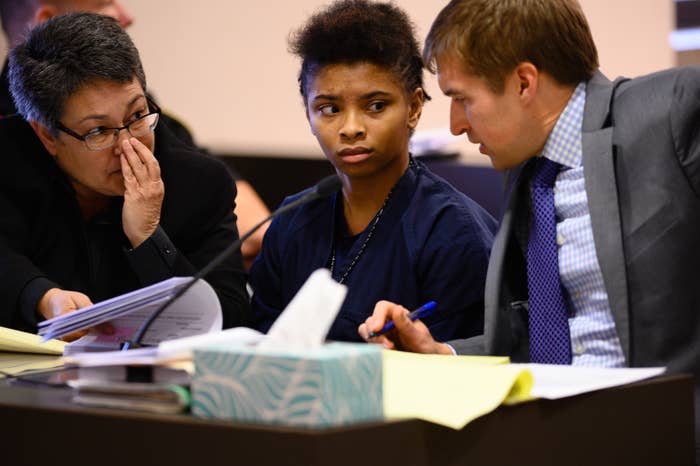
Five months ago, Cyntoia Brown-Long was released from prison after spending 15 years there for killing a man she said paid her for sex while she was a teenage victim of sex trafficking.
Now, another teenage sex trafficking victim is facing the possibility of a life sentence after killing her adult abuser. Chrystul Kizer, 19, confessed to fatally shooting 34-year-old Randy Volar in Wisconsin in 2018, saying she was tired of being sexually assaulted by him.
In an interview with BuzzFeed News' AM to DM on Tuesday, Brown-Long highlighted similarities between her and Kizer's cases and said it seemed "like history was repeating itself."
"Here was yet another situation where there was a young girl caught up with some unfortunate circumstances, who reacted out of trauma," Brown-Long said. "And the justice system wasn't necessarily trying to hear that, trying to see that."

According to the Washington Post, Kizer first met Volar when she was 16 after he responded to her ad on the classifieds site Backpage.com, which was shut down last year for facilitating sex trafficking.
Kizer, in need of money for snacks and school supplies, began seeing Volar. He allegedly paid her for sex and eventually began trafficking her to other men. Though she claimed in the Backpage.com ad to be 19, Kizer said Volar was definitely aware of her real age as he invited her over to celebrate on her 17th birthday.
Kizer wasn't the only girl Volar allegedly sexually abused. In February 2018, Volar was arrested on charges of child sexual assault after a 15-year-old girl called 911 from his house, saying he'd given her drugs and was going to kill her.
Despite finding evidence in his home that Volar was sexually abusing about a dozen minors — including "hundreds" of child sexual abuse videos and more than 20 videos of Volar with underage black girls — he was released without bail the same day.
Kizer said she had tried distancing herself from Volar because she was starting to get serious with a boyfriend, but when she told Volar, he allegedly threatened to kill her. She said she did not report the threat to police, not believing they would actually help her.
In June 2018, Kizer allegedly shot Volar in the head twice, lit his house on fire, and ran away in his car.
She confessed a few days later, saying she had done it because Volar had tried to sexually assault her once again and she was tired of it. Kizer said she had jumped up when he started touching her leg, and when she tried to get away, he got on top of her on the floor and tried to rip her pants off.
She was charged with one count each of first-degree intentional homicide, operating a motor vehicle without the owner's consent, arson of a building, bail jumping, and possession of a firearm by a felon, according to court records. Kizer had pleaded guilty to fleeing an officer in connection with a separate incident the day before officers responded to the fire at Volar's house and found his body.
Kizer's lawyers are trying to defend her using an "affirmative defense," a legal term which in this case means that people who commit crimes as a "direct result" of being trafficked can be acquitted. But the judge in Kizer's case said that kind of defense couldn't apply to Kizer, arguing the killing was premeditated, based on text messages the defendant had sent beforehand.
According to state law, in Wisconsin "a victim of Human Trafficking has an
affirmative defense for any crime he or she committed as a direct
result of the trafficking without regard to whether anyone was
prosecuted or convicted for trafficking." The law does not say anything about exceptions for crimes that are premeditated.
On AM to DM, Brown-Long hit back against those who think she and Kizer "chose" to enter into sex trafficking.
"That's simply not the reality of the situation," Brown-Long said. "That's not how the minds of young people work. Young people are, by nature, very susceptible to being manipulated by older individuals, and that's why laws are in place on statutory rape."
Brown-Long takes particular issue with the Wisconsin judge's decision not to allow for an affirmative defense in Kizer's case. She hopes lawmakers will "step up and clarify that no judge can just choose to ignore what [laws have] been passed."
"The justice system — it doesn't see us as people," Brown-Long said. "It doesn't really understand the human experience. There's no room for mercy. There's no room for taking into consideration, 'What was this person going through at this time?'"

